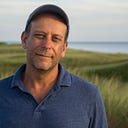Member-only story
China on the High Seas
Outlaw Ocean founder and New Yorker reporter Ian Urbina discusses illegal fishing, sea slavery, and how unethical seafood ends up on your plate.
Ian Urbina has been covering what might be the most mysterious and dangerous place in the world for nearly a decade now. I’m speaking of that vast swath of ocean that lies in between the territorial control of individual nations. These distant waters, usually referred to as “The High Seas” are far from empty. Not only do they teem with marine life, they are also the setting for all kinds of criminal activity that ranges from slavery to oil dumping to unsanctioned whaling to Illegal and unreported and unregulated fishing (IUU). Ian first started to lift the lid off this blackest of boxes in a series for the New York Times called “The Outlaw Ocean.” He would go on to write a book and found a nonprofit with the Outlaw Ocean name. Ian and The Outlaw Ocean Project just keep going and going, growing ever more ambitious in their reporting. This month The New Yorker published his latest investigation — a deep, troubling look at China’s offshore fishing fleet. It was an issue I always knew was huge but one I never personally felt ready to tackle. Ian and his team have tackled it and I was happy to catch up with him this week and see how this miraculous piece of reporting came…
